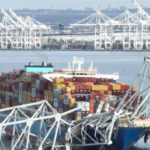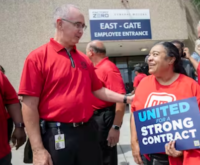By EDITH M. LEDERER
Associated Press
UNITED NATIONS (AP) _ U.S. Secretary of State John Kerry tackled two of the world’s most intractable conflicts at the U.N. Thursday _ urging support for a peace conference to end the escalating violence in Syria and a peace agreement to end nearly two decades of fighting in eastern Congo.
America’s chief diplomat presided at a U.N. Security Council meeting assessing progress in implementing a Feb. 24 peace accord signed by 11 African nations to end fighting in eastern Congo. He said the United States is deeply concerned at reports that key rebel groups are still receiving external support and demanded an end to rampant impunity.
Later, Kerry will meet with leaders of the Western-backed Syrian National Coalition to promote an international conference and a political solution to the conflict.
Earlier Thursday, U.N. Secretary-General Ban Ki-Moon announced that the Syrian conflict has claimed more than 100,000 lives since 2011, up from an estimate just over a month ago of 93,000 people killed.
Kerry, standing beside Ban, stressed that “there is no military solution to Syria.”
“There is only a political solution, and that will require leadership in order to bring people to the table,” he told reporters just before meeting the secretary-general.
At the start of Thursday’s Security Council meeting, the U.N.’s most powerful body adopted a presidential statement condemning renewed rebel attacks in Congo and demanding that all armed groups immediately disband and disarm.
Congo, a nation of 70 million people that is equal in size to Western Europe, has been plagued by decades of war. Its vast forests are rife with militias that have systematically used rape to destroy communities.
The signatories of the peace deal include Rwanda and Uganda, which were accused in a U.N. report last year of aiding the M23 rebel group which swept through eastern Congo in 2012 and captured the key city of Goma in November before pulling out under international pressure.
A U.N. report issued last month said Rwandan support for the M23 movement had waned in the last six month but had not ended. A subsequent report by Human Rights Watch said the rebel group still received training and supplies in Rwanda and was able to recruit there.
Both Rwanda and Uganda deny aiding the M23.
The council statement also expressed concern at increased activity in eastern Congo by the FDLR, a Hutu armed group linked to the 1994 Rwandan genocide, and reported attacks by the FDLR on Rwandan territory.
Diplomats said Rwanda objected to some proposed language in the draft presidential statement related to the M23, and the council statement did not mention outside support for the rebels.
Kerry was more direct.
“We are deeply concerned about reports of resumed external support for the M23, as well as support for the FDLR,” Kerry said without singling out any country.
Mary Robinson, the U.N. special envoy for Africa’s Great Lakes region went further, saying: “Sadly, there are credible reports of some activities in support of armed groups by different signatory parties to the framework” peace agreement.
Robinson said in her four months as special envoy “not a day goes by without a report of killings, rape, sexual assault and displacement of people” in eastern Congo.
“What strikes me is the lack of outrage and horror at this daily toll,” she said.
In the late afternoon, Kerry is scheduled to meet with the newly elected leader of the Syrian National Coalition, Ahmed al-Jarba, and his delegation who flew to New York from Paris where they held talks with President Francois Hollande.
France pushed for humanitarian corridors in Syria during the meeting and Hollande also discussed the delegation’s demand to deliver weapons to its combatants.
State Department spokesman Jen Psaki said Kerry’s meeting with the delegation provides an opportunity to “discuss with them not only the situation on the ground, but the path forward towards a political solution.” She said they will also discuss ways to bolster U.S. assistance to local communities in Syria.
The National Coalition delegation, which also includes Michel Kilo and Burhan Ghalioun, is expected to meet a number of U.N. ambassadors later Thursday at a session hosted by Germany. On Friday, the opposition group will meet informally with the Security Council.
___
Associated Press Writer Peter James Spielmann contributed to this report from the United Nations.










